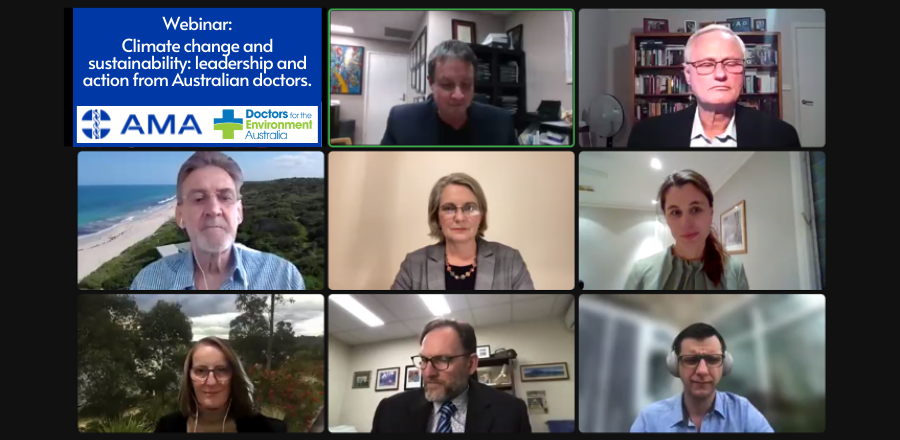AMA & DEA urge health sector to lead on climate change
Over 300 people, including the Chief Medical Officer Professor Paul Kelly, attended the AMA and Doctors for the Environment Australia (DEA) webinar – Climate change and sustainability: leadership and action from Australian doctors on Tuesday.

Over 300 people, including the Chief Medical Officer Professor Paul Kelly, attended the AMA and Doctors for the Environment Australia (DEA) webinar – Climate change and sustainability: leadership and action from Australian doctors on Tuesday.
AMA President Professor Steve Robson and DEA Chair Dr John Van Der Kallen hosted the webinar.
Federal Minister for Health and Aged Care the Hon Mark Butler MP told the webinar audience he is committed to pursuing a climate and health policy and better connecting the two.
Laureate Professor Nicholas Talley outlined the duty medical professionals have in treating climate change as a global health emergency, and Professor Alexandra Barratt highlighted the carbon footprint of low value care.
Eleven medical colleges provided updates on the climate action they are taking, and highlighted specific climate change health impacts related to their specialty.
Dr Eugenie Kayak from the DEA urged doctors to take greater action in their specialty.
Dr Kate Charlesworth provided a summary of all webinar presentations and highlighted three responsibilities for the healthcare sector moving forward: advocacy, mitigating the healthcare sector’s carbon footprint, and adaptation.
Professor Robson wrapped up the webinar saying “As President of the AMA, I seek a strong and united coalition for action because I don’t think we have any time to lose. As a profession, we have a responsibility to do everything we can to bequeath a heathy planet to our children and their children.
“Climate change will have health effects on a scale that people are barely able to comprehend.
“We’re already seeing a series of rolling health crises around the world, but these are just the beginning. We’re facing the prospect of literally billions of climate refugees across the planet, it’s a crisis so enormous that it’s almost impossible to grasp.”
The 11 presenting medical colleges signed on to a communique reflecting the acknowledgement of the extreme risk posed by climate change both to global health and to the health of all Australians, and their duty of care to act urgently. Signatories to this communique support:
- A net zero Australian healthcare system by 2040 with majority of emission cuts by 2030.
- The development of a national climate change and health strategy to facilitate planning for climate health impacts, which the Federal Government has committed to.
- Establishing a National Sustainable Healthcare Unit to support environmentally sustainable practice in healthcare and reduce the sector’s own emissions.
- Education of current and future doctors to:
- be well equipped to care for patients and populations impacted by the adverse health effects of climate change, and
- provide sustainable health care to support sector-wide emissions reduction.
- Collaboration on climate change mitigation strategies with populations most at risk of climate-related adverse health impacts, such as Aboriginal and Torres Strait Islander peoples.
The media release and communique is available here.
You can access the webinar here.



